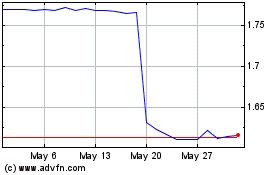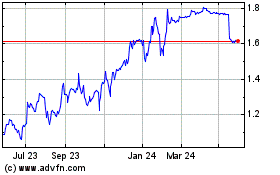By Benoit Faucon
LONDON -- The Trump administration says it expects Iran's oil
buyers to begin winding down their purchases Tuesday in response to
sanctions being reimposed by the U.S. Some are seeking
alternatives, but countries including China, India and France, are
considering creative measures to keep importing Iranian crude.
Starting this week U.S. sanctions against Tehran on sectors like
automotive and aircraft are set to return following President
Trump's decision in May to pull out of the nuclear agreement with
Iran.
Oil companies will have until November 4 to adjust to the
returning U.S. ban on buying Iranian oil. "The three-month
wind-down period is starting, " Dario Scaffardi, chief executive of
Italian refiner Saras SpA -- a buyer of Iranian oil -- told
analysts last week. "So, we expect to see the effects sort of
now."
The threat of dwindling oil sales is forcing Tehran and its oil
buyers to react. The U.S. sanctions come as Iran faces a collapsing
currency and protests over living conditions. Petroleum is a main
export, accounting for nearly a fifth of Iran's gross domestic
product.
But overall oil exports declined in July by 300,000 barrels a
day to 2.3 million barrels, according to Paris-based shipping-data
tracker Kpler, as European refiners cut purchases ahead of
returning sanctions. The country's losses could ultimately amount
to 1 million barrels a day, said Richard Nephew, who helped enforce
U.S. sanctions five years ago as deputy coordinator for sanctions
policy at the State Department.
In recent months, U.S. officials have said they expect Iran's
oil exports to either disappear completely or to decline
significantly. The Treasury Department has carried roadshows with
State Department and other government counterparts over the last 90
days explaining what sanctions will snap back when all the
wind-down periods end in November, a U.S. official said.
Italy's Saras already has decided to reduce Iranian oil
purchases before November because of the difficulty of finding
payment channels, according to executives. The company declined to
comment further.
Nations that regularly do business with Iran are in a difficult
position. "We have informed our oil customers that we will only buy
their commodities if they buy our crude," Asadollah Gharekhani,
spokesman for the Iranian parliament's energy commission told
Iranian state-media last month. It is unclear how mandatory such
practice will be. An Iran oil-ministry spokeswoman didn't return a
request for comment.
The European Union, China and India have said they won't enforce
sanctions -- unlike their response to restrictions against Iran oil
in 2012. But they may still bow to the pressure as their oil
companies would risk being blocked from the U.S. financial and oil
markets. Banks and shippers already are stopping trade with Iran
because their businesses are exposed to the U.S. Oil companies in
those nations are considering follow suit because they have assets
in the U.S. or are exposed to the U.S. financial system.
Last month, Iran's vice president Eshaq Jahangiri said the
country would privatize the sale of its crude, a workaround that
could be effective by putting the onus on private businessmen to
sell the commodity. Iran employed the method to market its oil
products and petrochemicals during previous sanctions with the help
of small Chinese and Russia banks and intermediaries, according to
Iranian traders and transaction documents reviewed by The Wall
Street Journal in 2015.
Tehran also has begun to increase reliance on the
privately-owned National Iranian Tanker Co., to replace foreign
tankers in deliveries to India, according to data from shipping
website Fleetmon.com, which gives access to data on tanker
movements.
Most importantly, Iran plans to use a barter system -- which
avoids sanctionable transfers to the nation -- through which oil
payments are deposited into accounts in oil-importing countries and
used by Tehran to buy goods.
Some European Union's nations may consider the process,
according to a European official involved in the contingency
planning. Countries like China, India and, more recently, Russia
have used it successfully to buy Iran's crude.
In a joint statement Monday, the EU, France, the U.K. and
Germany said they are committed to work on the continuation of
Iran's export of oil and gas.
Tehran also has started shipping to small buyers in Latin
America, including a delivery to Chile over this past weekend,
according to a European sanctions official and tracking data.
French, German and British governments are considering the use
of their national banks to activate accounts for the Iranian
central bank, which could receive oil payments, according to
European officials. However, "the United States could still
sanction the oil companies if they pay the central banks for the
oil," said Mr. Nephew, who is now an adjunct professor at Columbia
University's Center on Global Energy Policy.
Among other options, the French government is considering taking
charge of the shipping and storage required to import Iran oil to
replace private companies, the European official said. France could
also buy Iranian oil from countries like China, India or Russia --
possibility refined for the latter -- if they have obtained
exemptions, the official said.
The French finance ministry didn't return a request for
comment.
Meanwhile, Total SA, the main importer of Iranian oil to France,
has cut its purchases from Tehran and largely filled the gap with
Russia's Urals crude grade, according to European traders.
Total didn't reply to a request for comment.
Shipping data from Kpler shows France hasn't imported Iranian
oil since June 18, a loss largely offset by a 63% rise in Russian
oil imports to France over the same period.
The impact of upcoming sanctions has been more mixed in Asia,
where many refiners are state-owned and banks are often exposed to
the U.S. financial system. South Korea didn't purchase oil from
Iran last month for the first time in three years, according to
Kpler. Meanwhile, Indian imports rose by 118,000 barrels a day.
Still, an Indian refinery owned by Reliance Industries Ltd.
began buying crude from faraway countries such as Colombia and the
U.S., a rarity. "They seem to be testing alternatives as they
prepare to reduce Iranian oil imports," said Kpler's economic
analyst Reid I'Anson.
Reliance didn't return a request for comment.
China, generally the largest buyer of Iranian oil, is gearing up
to take more, said a senior U.S. official said. The Asian
powerhouse is engaged in a dispute over trade tariffs with the U.S.
and uses a state-run bank with no American connection, giving it
leverage in fighting the sanctions.
Sarah McFarlane and Ian Talley contributed to this article.
Write to Benoit Faucon at benoit.faucon@wsj.com
(END) Dow Jones Newswires
August 06, 2018 10:04 ET (14:04 GMT)
Copyright (c) 2018 Dow Jones & Company, Inc.
Saras Raffinerie Sarde (BIT:SRS)
Historical Stock Chart
From Nov 2024 to Dec 2024

Saras Raffinerie Sarde (BIT:SRS)
Historical Stock Chart
From Dec 2023 to Dec 2024
